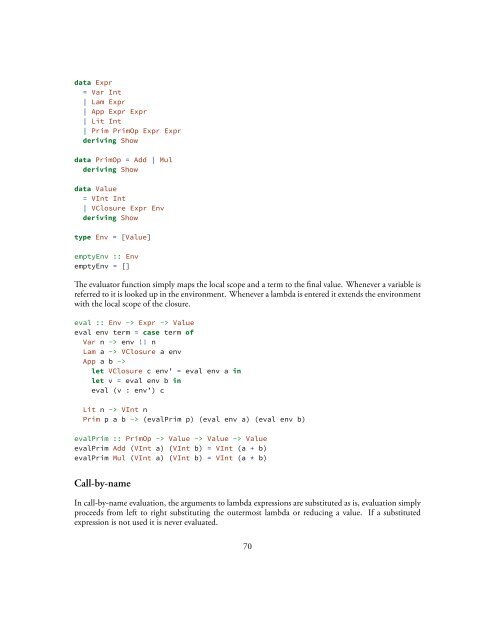Create successful ePaper yourself
Turn your PDF publications into a flip-book with our unique Google optimized e-Paper software.
data Expr<br />
= Var Int<br />
| Lam Expr<br />
| App Expr Expr<br />
| Lit Int<br />
| Prim PrimOp Expr Expr<br />
deriving Show<br />
data PrimOp = Add | Mul<br />
deriving Show<br />
data Value<br />
= VInt Int<br />
| VClosure Expr Env<br />
deriving Show<br />
type Env = [Value]<br />
emptyEnv :: Env<br />
emptyEnv = []<br />
e evaluator function simply maps the local scope and a term to the final value. Whenever a variable is<br />
referred to it is looked up in the environment. Whenever a lambda is entered it extends the environment<br />
with the local scope of the closure.<br />
eval :: Env -> Expr -> Value<br />
eval env term = case term of<br />
Var n -> env !! n<br />
Lam a -> VClosure a env<br />
App a b -><br />
let VClosure c env’ = eval env a in<br />
let v = eval env b in<br />
eval (v : env’) c<br />
Lit n -> VInt n<br />
Prim p a b -> (evalPrim p) (eval env a) (eval env b)<br />
evalPrim :: PrimOp -> Value -> Value -> Value<br />
evalPrim Add (VInt a) (VInt b) = VInt (a + b)<br />
evalPrim Mul (VInt a) (VInt b) = VInt (a * b)<br />
Call-by-name<br />
In call-by-name evaluation, the arguments to lambda expressions are substituted as is, evaluation simply<br />
proceeds from left to right substituting the outermost lambda or reducing a value. If a substituted<br />
expression is not used it is never evaluated.<br />
70


